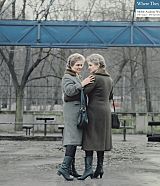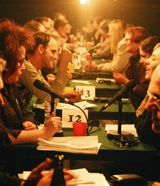Mobile Academy in Warsaw: “Ghosts, Spectres, Phantoms, and the Places Where They Live”
[ Two-part interdisciplinary summer academy in Warsaw ]
The Mobile Academy is a temporary learning unit that keeps changing its location and offers its participants an intensive interdisciplinary programme on a particular theme. Under the guidance of international artists the participants develop projects, studies, and presentations in different courses, which are complemented by theory classes and field trips relating to the Academy’s current theme. On offer are five courses in photography, acting, directing, dance, choreography, conceptual art, and art theory.Ghosts, Spectres, Phantoms, and the Places Where They Live
The Mobile Academy Warsaw will provide an international comparison of the ghostly in architecture, politics, art, theory, and our everyday life. At different times of day it will be possible to discern different degrees of social phantomisation, in oneself and one’s surroundings: perhaps one was once haunted by ghostly forces that came from the non-place of utopia, perhaps one was oneself the ghost of an utopian communist society; perhaps, these days, one is a someone-or-other somewhere-or-other in the realm of facts, a kind of non-self, which almost seems to be a precondition and economic requirement of success. Ghosts are creatures or ideas that are not alive, not dead, not yet born or unable to die, neither present nor absent – they are able to put reality in limbo and deprive it of its matter and provability, at least for the moment of their appearance.
In Warsaw, the Mobile Academy will look for ghostly places and the undead, and trace the social circumstances that produced them. It will collect ghostly knowledge and pass it on.
Already in October 2005, the Mobile Academy will come to Warsaw with a preliminary event: the Black Market for Useful Knowledge and Non-Knowledge I is an installation at which a hundred experts will be available for counselling interviews on “Invisible, Unknown, and Ghostly Knowledge.” There will be a “ghost library” operating in real time: an installation brought to life by the audience.
Prof. Dr. Maria Janion, Institute of Literary Research of the Polish Academy of Science Warsaw (Instytut Badań Literackich PAN Warszawa), is the Honorary President of the Mobile Academy Warsaw.
The Spook Goes On
From the Flying University to the Mobile Academy
by Stefanie Peter
Does anyone still remember Professor Abronsius? He was the tragic hero of Roman Polanski’s film The Fearless Vampire Killers of 1967. Notoriously denounced by his colleagues at the University of Königsberg as ‘the old crackpot’, Professor Abronsius was a charlatan who had turned his back to the tried and trusted methods the critical sciences. In order to expand his research to the field of the completely and utterly unlikely, he distinguished himself by the fact that he was able to see ghosts. He knew better than all others about the essence of being a vampire, and had a sweeping knowledge about the side effects of well-known objects such as crucifixes and mirrors had on the living dead. That ‘Vampirology’ did not belong to the curriculum of the canonical sciences, didn’t matter to him, for his real thirst for knowledge would hold to no mere academic conventions and stretched beyond the bounds of any semester course listings.
When Professor Abronsius brought both the effectiveness of a garlic clove combined with a bat’s sense of navigation (vis-à-vis ultrasound), it made him into a hero of interdisciplinary investigation. And as a representative of those dissident sciences, derivative of Roland Barthes’s thinking, such knowledge resonates more as nonsense than any ‘knowledge’ as such. ‘Science’ is, according to Barthes, ‘that which is taught’, and it follows then, that one acquires a doctorate in the field of the aesthetics, psychology, and sociology, not however in the field of heraldry, semantics or ‘victimology’. (Taken from the German translation of Roland Barthes, “Das Rauschen der Sprache”, Frankfurt am Main, 2006, P.9.) Through science’s traditional classifications, through rubrics and categorizations, ‘learnable’ knowledge is forced into a corset, which defines itself through exclusions and leaves no room for the ‘in-between’ or transcendence of the established norms.
When the Mobile Academy’s first away game takes place, they will be reminded, without aving wanted or planned, that they are grasping back to another form of transmitting knowledge that harks back to a very long and established tradition (especially in Warsaw). Indeed, because women were denied entrance into the academies, the concept of the ‘flying university’ emerged in the 19th century by women who organized themselves into loose circles, yielding no less than a Nobel Prize winner: the physicist Marie Curie. Breaking with the university that kowtowed to the prevailing ideology of the ruling regime, in the 1970s and 1980s dissident intellectuals like Adam Michnik, Władysław Bartoszewski, and Bronisław Geremek revived a nonconformist tradition of teaching in their own private homes. What does the ‘flying university’ then have in common with the Mobile Academy? It undermines the official state pedagogy in that it is neither tied to a particular curriculum nor specific regulations for obtaining a degree; nor is it aligned with any traditional architecture, by which normally the ‘organisation’ of knowledge finds a concrete manifestation of its power. When the Mobile Academy sanctions the study spirits, ghosts, and phantoms, it takes the disapproval of such popular science seriously and pursues uncertain territory. One must proceed as Professor Abronsius would: keeping one’s eyes peeled not only for the obvious but also for the incredible. And when one distinguishes between those premature restless spirits, one comes upon the traces of the repressed and the forbidden, confirming indeed that the spooks are abound.



